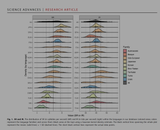What's better? Analytic languages or synthetic languages? And why does it seem like all old languages are synthetic?
>>24641796 (OP)
>And why does it seem like all old languages are synthetic?
Old Indo-european languages, and even that is not entirely true. Ancient Chinese was more analytic than today.
>What's better?
Mostly analytical languages are slightly more efficient at pushing information through (provided you don't go isolating) but even that is so blurred in covariant factors I wouldn't put too much emphasis on it.
>And why does it seem like all old languages are synthetic?
Old Indo-european languages, and even that is not entirely true. Ancient Chinese was more analytic than today.
>What's better?
Mostly analytical languages are slightly more efficient at pushing information through (provided you don't go isolating) but even that is so blurred in covariant factors I wouldn't put too much emphasis on it.


